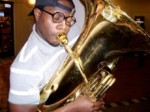Tampa musicians get ‘Practiceroom’

Joel Fenelon ended college on a high note, and the Parisian who majored in music performance wants other students to do the same.
Fenelon’s company began researching an initiative to bridge the gap between music students and professionals nearly two years ago. Practice is Protein for Music, or Project PPM, aims to unite musicians who have a background in any instrument played in formal music ensembles, mainly classical and jazz.
The Project PPM founder and University of Tampa (UT) graduate said he started the project because he felt the need to strengthen the Tampa music community.
“The school system in Europe is completely different. Over there, we learn things very young that you guys first learn in college,” Fenelon said. “The quality of music can be a lot better here, but it’s not. They’re cutting arts programs throughout the country because America doesn’t value music the same way European countries do.”
The project will operate on multiple levels, including a fall concert series in which USF is scheduled to participate.
“As far is USF involved, we’re looking to launch a 100-concert series. (John) Carmichael, the new music department chair, has agreed along with UT and two other schools to include all of the concerts in the series,” Fenelon said. “The series will be called Get Out and Muzik, and we use ‘muzik’ as a verb here to really emphasize that we want a lot of people engaged in this. We want to make music more popular around Tampa, which we’re using as a test market. By the first week of August, we’ll have every date finalized.”
Also in August, Fenelon’s group will launch practiceroom.org, an educational social networking tool whose members will range from individual musicians and tutors to universities, school bands and instrument vendors. The site will initially be specific to Tampa Bay, but will incorporate national users by spring 2009.
Fenelon said that the ultimate goal of the site is to unite Tampa musicians.
“At USF, hardly any of your musicians know our musicians at UT,” he said. “There’s no system in place for students to get together and share things. The site will help with that problem.”
The site will feature online music courses for students and the opportunity for users to upload and showcase musical performances on their personal profiles. Online tutors and established musicians will be able to share their experiences with students who want to pursue their talents on a professional level.
While Fenelon’s short-term goals will begin changing the shape of the Tampa music community this year, he said he has even bigger plans for the future.
“We’re planning to launch the first College Music Festival by the end of 2011. The festival is for every school in the country to bring their top ensembles for events day in and day out,” he said. The festival will be staged annually if its first year is successful.
According to the Practiceroom business plan, “Without such an opportunity the ability of a musician to fully grow and compete for top spots in post-undergraduate programs and top music jobs is diminished. The majority of the festival will be paid for by the proceeds from the Web site. Our goal is to make the festival free to schools and individuals who are members of Practiceroom.”
The festival will also offer scholarships to motivate schools and students to participate.
“We want to help by giving the ‘You Were Caught Practicing’ (YWCP) scholarship to dedicated musicians around the world. Professors nominate students for this award, and PPM goes out and sees for itself the musician’s aspiration, and gives the musician an instant $1,000 (or equivalent) scholarship,” the business plan states. “We will offer the ‘Grigorios Zamparas’ Scholarship to talented piano musicians around the world. The system works the same as the YWCP scholarship.”
There is one catch for winners of both awards: “You must play a solo in the concert if you win a scholarship,” Fenelon said. The scholarships will not be disbursed to applicants until spring 2009.
While Project PPM will give local musicians better tools for educational and professional development, Fenelon said his motivation was much simpler than that.
“What we’re doing has the potential to really shift American culture. My parents didn’t see a future for me in music, but I did it anyway. A lot of kids don’t have the means to continue studying classical music,” he said.






